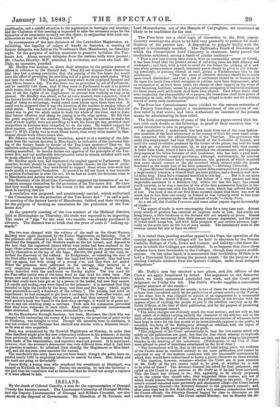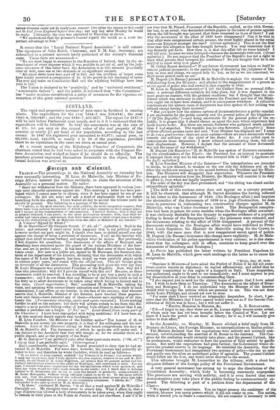IRELAND.
By the death of Colonel Conolly, a seat for the representation of Donegal County has become vacant. The Lieutenant-Colonelcy of Donegal Militia, and the Deputy-Lieutenancies of Donegal and Kildare Counties, are also placed at the disposal of Government. Mr. Hamilton of St. Ernanis, and Lord Mountcharles, son of the Marquis of Conyngham, are mentioned as likely to be candidates for the seat.
The Poor-laws are a chief topic of discussion in the Irish papers. Country meetings are about to be held very generally to petition for modi- fications of the present law. A disposition to grapple boldly with the subject is increasingly manifest. The Ballinasloe Board of Guardians, of which the Conservative Lord Clancarty is chairman, lately passed the resolutions subjoined, among a batch of similar tendency-
" That a new rate having been struck, with an outstanding arrear of 6,0004 it has been found that the present means of enforcing rates are both dilatory and inadequate ; and that, with a view to avoid for the future the striking of a new rate while arrears remain unpaid, summary power should be given to sell default- ing townlands, or portions thereof, at once, giving a Parliamentary title to the purchasers." . . . . " That the areas of electoral divisions should be in many cases mach diminished ; and that a law of settlement should be so framed as to fix upon the lands from which occupiers or cottiers have been dispossessed, after an occupation of at least three years, the charge of their support in the event of their becoming destitute, unless by a subsequent occupation or industrial residence for three years such settlement shall have been altered. That where doubt shall arise respecting the chargeability of a pauper, the Guardians shall have power of examining on oath, with the restriction of being obliged to make and file a written record of every such examination."
The Poor-law Commissioners have yielded to the earnest entreaties of the Fermoy Guardians against a recommencement of the system of out- door relief in that union; and have authorized an increase of the present means for administering in-door relief.
The Irish correspondents of some of the London papers crowd their let- ters with such details as the following, in proof of their assertion that " a social revolution is now in progress "- " An application, I understand, has been made from one of the most fashion- able members of the local aristocracy in the county of Cork for some small situa- tion connected with the administration of the Poor-law. The gentleman who seeks this employment had been High Sheriff of the Yorkshire of Ireland, and until the social revolution produced by the failure of the potato, has held his head as high as any other commoner, ay, or any peer connected with that county. A letter from Cork, which I have seen, mentions the circumstance, and expresses deep regret at the fallen fortunes of this landowner, who has been a good land- lord and a benevolent country gentleman, although, unfortunately, he received with his large inheritance heavy encumbrances, the payment of which required that rents should remain at the old standard which existed while the potato flourished as the staple food of the Irish peasantry."—Morning Chronicle. "A great Munster landlord is staggering ander debts contracted forty years ago for a large country mansion, a church built pro bono publico, and a demesne-wall seve- ral miles long. These have remained unsettled to this day. . . . But it is not alone the landlords who are breaking down. The failure of a very prudent and most respectable merchant in a Southern city, within the last few days, has caused much surprise, as he was a member of one of the first commercial families in Ire- land. He was connected with the Irish home trade, which has suffered fearfully of late. The head of one of our first firms recently stated that there was now as much due to him from one county in Ireland as was formerly owed to him from one of the four provinces under the old system of trade."—Daily News.
As a set-off, the Dublin Freeman and some other papers report favourably of trade- " The aspect of trade is more encouraging than for a long time past. Almost every article of produce has received an impetus more or less; and stocks not being heavy, a little briskness in the demand will act sensibly on prices. Shares also appear to be recovering from their present ruinous depression, and the price of bread-stuffs keeps low, and with little prospect of any serious advance, espe- cially as the ports open on the 1st of next month. The satisfactory state of the revenue cannot fail also to have its effect."
It is stated that, pending another appeal to the Pope, the operation of the rescript against the new Colleges will be held in abeyance by the Roman Catholic Bishops of Cork, Down and Connor, and Galway—the three dio- ceses in which the Colleges are established. It so happens that those three Prelates have been favourable to the Colleges, though they require modifi- cations. On the other hand, it is announced that Archbishop M`Hale is to hold a Provincial Synod during the present month, " for the purpose of ex- cluding Catholic students from the Queen's Colleges, under most stringent obligations."
Mr. Duffy's case has attained a new phase, and the officers of the Crown are again humiliated by defeat. The argument on the demurrer which we lately epitomized concluded last week, and the Court gave judgment on Friday the 5th. The Dublin Warder supplies a convenient popular abstract of the result- " The indictment contained six counts: in two of these the offence was charged to have been committed solely by the publication of certain articles in the Nation; in the other four it was charged to consist of an engagement in a treasonable movement with Mr. Smith O'Brien, and the publication of the articles with the express object of exciting the people to join in the rebellion carrying on by Mr. Smith O'Brien at the time of their publication, and for the purpose of promoting a previously arranged concert. -" The latter charges are obviously much the most serious • and not only so, but they admit of evidence varying entirely the character of the articles; and on the faith of the admissibility of such evidence an enormous number of witnesses have been kept in town for the last month at no inconsiderable expense to the public, to establish the facts of the Ballingarry attempt at rebellion, with the object of fastening on Mr. Duffy participation in its guilt. "The judgment of the Court substantially is, that the two counts which rely solely on the publication are good, but that the four which attempt to implicate Mr. Daffy in the movements of Mr. O'Brien are bad, and this owing to the grossest blunder in the drawing of the indictment. [Publications of the 17th of Jane were alleged in proof of intentions entertained on the 3d of June.]
"The consequence will be, that in the event of trial taking place, the evidence of the Crown must be confined entirely to the mere publication, and cannot be extended to any of the matters connected with the treasonable movements by which they would have endeavoured to fasten a guilty character on these articles.
"The question, however, remains—whether the Cotirt are to pass sentence on Mr. Duffy on the two counts ruled to be good, or whether he is now to be tried on these? The Attorney-General has asked for final judgment, and called on the Court to pass sentence on Mr. Duffy as if he had been convicted. This the Court has refused to do; but, appearing to be utterly perplexed as to the course they should take, they suggested three courses, any one of which would remove from themselves the onus of deciding on the point. The pri- soner's counsel remained most perversely and obstinately silent—the Court looked to the Attorney-General—the Attorney-General to the prisoner's counsel; and, after some time lost in this dumb-show, and a very anxious consultation between the Crown officials, the Attorney-General begged for time to determine on the course they would pursue. The Court named Monday; but on Monday the At- torney-General could not be ready—an answer (we opine the reason to be) could not be had from England before that day; but any day after Monday he would be ready. Ultimately, the case was adjourned to Thursday at eleven.
" We understand that the prisoner's counsel regard the result as a most im- portant advantage to him."
It seems that the " Loyal National Repeal Association " is still extant. The signatures of John Ketch, Chairman, and T. M. Ray, Secretary, are subscribed to a printed account lately published of the society's financial state. These facts are announced- " We are most happy to announce to the Repeaters of Ireland, that by the re- trenchment of every expense which it was possible to get rid of, and by the judi- cious allocation of this latter fund, the Association is at this moment practically clear of debt, save one or two demands of no significant amount.
"All small debts have been paid off in full, and the creditors of larger sums have kindly accepted a compromise of 4s. in the pound in full discharge of same. The rent and taxes on Conciliation Hall and the adjoining buildings have been paid in full."
The Union is declared to be "positively," and by "universal sentiment," "a miserable failure "; and the public is informed that " the Committee " has " under anxious consideration a series of measures for the vigorous re- sumption of this great national question."



























 Previous page
Previous page